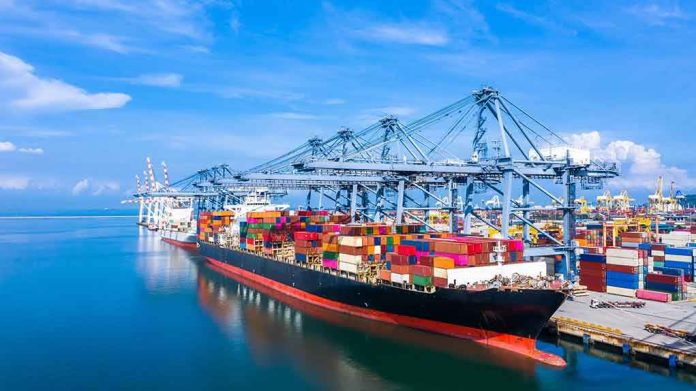
The UN’s International Maritime Organization has rammed through a global carbon tax scheme on shipping that threatens American sovereignty and economic independence, despite fierce opposition from the United States and concerns about taxation without representation.
Story Highlights
- IMO approved global carbon pricing mechanism for shipping over U.S. objections in April 2025
- Scheme covers ships over 5,000 gross tonnage, affecting 85% of global shipping emissions
- Developing nations and smaller shipping states claim lack of fair representation in decision-making
- Framework scheduled for formal adoption in October 2025, implementation by 2027-2028
- Critics warn of increased costs for American consumers and businesses reliant on global trade
UN Pushes Forward Despite American Opposition
The International Maritime Organization reached agreement on its Net-Zero Framework in April 2025, establishing the first global carbon pricing mechanism for shipping emissions. IMO Secretary-General Arsenio Dominguez acknowledged difficult negotiations and significant opposition from several countries, including the United States. The framework targets net-zero emissions by 2050 and applies to vessels over 5,000 gross tonnage, covering approximately 85% of the sector’s emissions. This represents a dramatic expansion of international regulatory authority over a critical component of global commerce.
Taxation Without Representation Concerns Mount
The IMO’s consensus-driven processes have been criticized for favoring larger, more influential member states while marginalizing smaller nations and developing countries. Many affected parties argue they lacked adequate input in crafting regulations that will impose significant economic burdens on their shipping operations and trade relationships. The scheme establishes a Net-Zero Fund ostensibly to support vulnerable countries, but concerns persist about equitable access and governance of these resources. This pattern mirrors historical grievances about international bodies imposing costs without proper representation.
Economic Impact Threatens American Interests
Industry groups warn the carbon pricing mechanism will create substantial compliance costs and competitive disadvantages for shipping operators, with these expenses likely passed through to American consumers and businesses. The framework’s two-tier carbon trading system may prove complex to administer and could create loopholes benefiting nations willing to circumvent regulations. Shipping companies operating older, less efficient vessels face immediate pressure to invest in cleaner technologies and alternative fuels, potentially driving market consolidation that favors well-capitalized foreign competitors over American maritime interests.
The scheme’s implementation timeline shows the urgency of international climate bureaucrats to impose their agenda. Formal adoption is scheduled for October 2025, with entry into force expected by 2027-2028. This compressed schedule leaves little time for meaningful consultation with affected American industries or consideration of alternatives that would protect national economic interests while addressing environmental concerns through market-based solutions rather than global taxation schemes.
Trump Administration Poised to Reject Global Overreach
The timing of this UN power grab coincides perfectly with President Trump’s return to office and his commitment to putting America First in international negotiations. The administration’s opposition to global taxation schemes and defense of American sovereignty positions the United States to reject participation in this costly regulatory framework. Previous precedents exist for American withdrawal from international agreements that threaten economic interests or constitutional principles, providing a clear path forward for protecting American shipping and trade from this latest example of international overreach.
The broader implications extend beyond shipping to establish concerning precedents for international taxation authority over American economic activity. This represents exactly the kind of globalist agenda that undermines national sovereignty and transfers decision-making power from elected American officials to unaccountable international bureaucrats who prioritize ideological goals over practical economic realities.
Sources:
UN News – IMO reaches agreement on Net-Zero Framework
UN News – Further coverage of shipping emissions deal
World Bank – New climate deal for shipping analysis
IMO – Historic Background on GHG regulations





